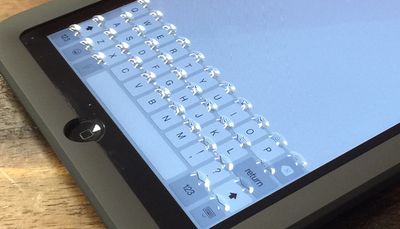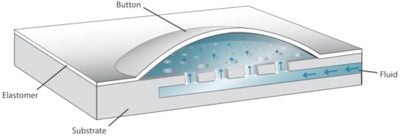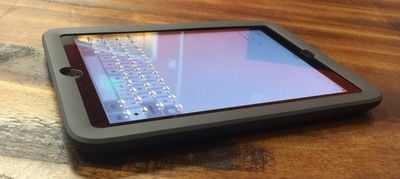For the last several years, Tactus Technology has been working on displays that take advantage of microfluidic technology, with buttons that raise up and disappear on demand for a superior touchscreen typing experience.
As of today, the company is ready to unveil its first product to the world, an iPad mini case called "Phorm." An all-in-one case, keyboard, and screen protector, Phorm can dynamically add and remove tactile buttons on the iPad mini's screen to add texture to the on-screen keyboard.
As seen in the video above, sliding the bar on the back of the Phorm case to the right causes small fluid-filled physical buttons to pop up on the screen protector portion of the case, giving users a tactile typing experience while still allowing them to use the default iOS keyboard. Shifting the bar to the left causes the buttons to disappear again, allowing the touchscreen to be used as normal.

Here's how it works: there are a series of small channels filled with fluid behind an elastomeric panel (aka the screen protector portion of the case) and when activated by the slider, pressure is introduced, causing the fluid to come up through the channels and into holes, where it presses against the elastomer, physically changing and morphing the display portion of the case to create buttons. In the opposite slider position, the pressure is released and the buttons disappear as the liquid is dispersed back into the channels.

According to Tactus Technology CEO Craig Ciesla and CTO Micah Yairi, who spoke to MacRumors ahead of Phorm's launch, the case uses a tiny amount of fluid that poses no harm to an iPad should it be dropped or damaged in some way. In fact, the Tactus team extensively tested the Phorm, performing drop tests, scratch tests, and more, and found that the case and its protective front panel provide solid protection for an iPad and can potentially keep the glass from shattering if dropped.
Ciesla and Yairi said that usability was one of the most important aspects Tactus considered when developing the Phorm case. In internal and third-party testing with people aged 19-70 with a wide range of hand sizes, 70 percent preferred the Tactus solution to a touchscreen.

The Phorm case is meant to stay on an iPad all the time, alleviating the need to switch cases and accessories regularly to accommodate different tasks. As Ciesla and Yairi pointed out, the Phorm offers several benefits over a Bluetooth keyboard -- there's no battery drain, there's no need to charge it, and it provides access to all built-in iOS keyboard features like word prediction and spell correction, with the addition of tactile feedback for faster typing.
"We built Phorm so tablet users will never again have to choose between thin stylish devices with touchscreens and amazing usability," said Dr. Craig Ciesla, CEO and co-founder of Tactus. "Typing on a flat touchscreen is still a really unnatural user experience. Adding a tactile dimension to an otherwise flat surface changes the way we will interact with all the screens in our lives. This is just the beginning."
The Phorm case for the iPad mini can be pre-ordered today from the Phorm website for the introductory price of $99, and orders are expected to ship in the summer of 2015. There are two colors available -- slate gray, designed for the space gray iPad mini, and sky gray, designed for the silver iPad mini.
Currently, Phorm is only available for the iPad mini, but the Tactus Technology team has plans to launch an Phone 6 Plus Phorm case in the near future. Phorm cases for iPad Air 2 and iPhone 6 are also in the product pipeline.





















